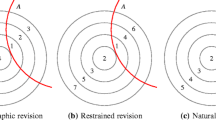Abstract
Indexical beliefs pose a special problem for standard theories of Bayesian updating. Sometimes we are uncertain about our location in time and space. How are we to update our beliefs in situations like these? In a stepwise fashion, I develop a constraint on the dynamics of indexical belief. As an application, the suggested constraint is brought to bear on the Sleeping Beauty problem.
Similar content being viewed by others
Notes
Formally, P C is a function from sentences into the interval [0,1].
Distances in this sense would perhaps better be called directed distances; for the sake of brevity, I will omit this attribute.
In most cases, there will be more than one indexical expression which satisfies this constraint (think of ‘tomorrow’ and ‘the day after today’); let us work with the most natural choice.
As usual, \(P_C(E[C/C^*])>0\) and so also \(P_{C^*}'(E)>0\) is assumed for the conditional probability to be defined.
The analysis of The Prisoner by Arntzenius (2003, sec. II) seems to contain a similar idea.
A note of caution. Principle ACC is meant to describe a canonical way of how indexical belief tends to develop. It should not be expected to be able to deal with phenomena alien to indexical belief. Cp., for instance, the phenomenon of losing evidence due to strong defeaters as described in Williamson (2000, p. 219).
One may, however, reasonably hold that evidence is more finely individuated than it is assumed in this line of argument. For instance, Horgan (2004) argues that contexts of subjective probability are intensional; they do not allow for substitution of co-referential indexical terms salva veritate. Cp. also Weintraub (2004). One may even go further and argue that contexts of subjective probability are hyper-intensional; for such a view, see Williamson (2006).
Cp. Horgan (2004, p. 13).
Positively, Kierland and Monton (2005) propose an epistemic goal which can be described as the aim of minimizing the inaccuracy of one’s beliefs. However, their proposed method is not univocal and therefore leaves it open how we should update possibly indexical beliefs in particular cases.
Cp. the discussion in Arntzenius (2003).
As an aside, let me mention at this point that ACC is not supposed to apply to proper cases of forgetting; such cases seem to require a treatment of their own.
For lack of space, I will not discuss more complex rivals to the thirders’ position. For instance, Bostrom (2007) offers a hybrid model for self-locating belief by which he attempts to unify the major bits of the thirders’ and the halfers’ camp (however, at the cost of violating a plausible instance of conditionalization).
Cp. Jenkins (2005, p. 199).
Cf. Jenkins (2005, p. 198).
References
Arntzenius, F. (2002). Reflections on Sleeping Beauty. Analysis, 62, 53–62.
Arntzenius, F. (2003). Some problems for conditionalization and reflection. The Journal of Philosophy, 7, 356–370.
Bostrom, N. (2007). Sleeping Beauty and self-location: A hybrid model. Synthese, 157, 59–78.
Dorr, C. (2002). Sleeping Beauty: In defence of Elga. Analysis, 62, 292–296.
Elga, A. (2000). Self-locating belief and the sleeping Beauty problem. Analysis, 60, 143–147.
Hitchcock, C. (2004). Beauty and the bets. Synthese, 139, 405–420.
Horgan, T. (2004). Sleeping Beauty awakened: New odds at the dawn of the new day. Analysis, 64, 10–21.
Jenkins, C. (2005). Sleeping Beauty: A wake-up call. Philosophia Mathematica, 13, 194–201.
Kierland, B., & Monton, B. (2005). Minimizing inaccuracy for self-locating beliefs. Philosophy and Phenomenological Research, LXX, 384–395.
Lewis, D. (1980). A subjectivists guide to objective chance. In: R. C. Jeffrey (Ed.) Studies in Inductive Logic and Probability, 2, (pp. 263–93). Berkeley: University of California Press.
Lewis, D. (2001). Sleeping Beauty: Reply to Elga. Analysis, 61, 171–176.
Monton, B. (2002). Sleeping Beauty and the forgetful Bayesian. Analysis, 62, 47–53.
Weintraub, R. (2004). Sleeping Beauty: A simple solution. Analysis, 64, 8–10.
Williamson, T. (2000). Knowledge and Its Limits. Oxford: Oxford University Press.
Williamson, T. (2006). Indicative versus subjunctive conditionals, congruential versus non-hyperintensional contexts. In: E. Sosa, & E. Villanueva (Eds.). Philosophical Issues, 16, 310–333.
Acknowledgments
This paper has greatly profited from discussion with Heather Demarest, Nick Haverkamp, Miguel Hoeltje, Thomas Kroedel, Alexander Steinberg, Alastair Wilson, and the participants of the MLE seminar 2006 in Oxford at which I first learned about the Sleeping Beauty problem. I would also like to thank two anonymous referees of this journal for their extensive and very helpful comments. Special thanks are due to Benjamin Schnieder for numerous help with various earlier drafts of the paper. Research for the present paper has been made possible through the generous support of the Deutsche Forschungsgemeinschaft.
Author information
Authors and Affiliations
Corresponding author
Rights and permissions
About this article
Cite this article
Schulz, M. The Dynamics of Indexical Belief. Erkenn 72, 337–351 (2010). https://doi.org/10.1007/s10670-010-9209-3
Received:
Accepted:
Published:
Issue Date:
DOI: https://doi.org/10.1007/s10670-010-9209-3




